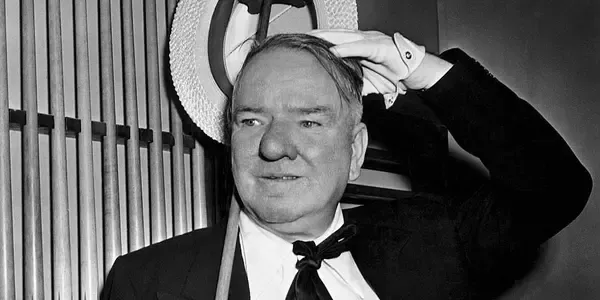What is W. C. Fields net worth estimated? How did he get his fortune?

Understanding W. C. Fields' Net Worth
W. C. Fields' Net Worth was estimated at around $100 thousand at the time of his death in 1946. Adjusting for inflation, this would be roughly equivalent to approximately $1.6 million today. Fields was a renowned American comedian, actor, writer, and juggler whose financial legacy remains a topic of interest.
Born in Darby, Pennsylvania, in January 1880, W. C. Fields carved a niche for himself in the entertainment industry. He initially gained fame in vaudeville as a silent juggler. His talents eventually earned him a spot in the Ziegfeld Follies and on Broadway in 'Poppy.' Fields' filmography includes classics like 'Pool Sharks,' 'It's the Old Army Game,' and 'David Copperfield.' He was honored posthumously with two stars on the Hollywood Walk of Fame in 1960. Fields' life was cut short by an alcohol-related gastric hemorrhage on December 25, 1946, when he was 66 years old.
What is W. C. Fields net worth?
| Name | W. C. Fields |
|---|---|
| Category: | Richest Celebrities › Richest Comedians |
| Net Worth: | $100 Thousand |
| Birthdate: | Jan 29, 1880 - Dec 25, 1946 (66 years old) |
| Birthplace: | Darby |
| Gender: | Male |
| Height: | 5 ft 8 in (1.73 m) |
| Profession: | Comedian, Actor, Writer, Screenwriter, Juggler |
| Nationality: | United States of America |
'I spent half my money on gambling, alcohol, and wild women. The other half I wasted.' – W. C. Fields
The Early Days of W. C. Fields
William Claude Dukenfield, better known as W. C. Fields, came into the world on January 29, 1880, in Darby, Pennsylvania. His father, James Lydon Dukenfield, was an English immigrant and a Civil War veteran. After settling in the United States, James worked as a produce merchant and part-time hotel keeper. Fields' mother, Kate Spangler Felton, was of Protestant British descent.
Fields' relationship with his father was tumultuous, leading him to run away multiple times from a young age. His formal education was minimal, and by age 12, he was working with his father before another fallout led him to leave for good. His interest in juggling took root during his teenage years, inspired by a local theater performance.
Vaudeville Ventures
In 1898, W. C. Fields donned a 'scruffy beard and shabby tuxedo' for his initial vaudeville acts. Inspired by the 'Original Tramp Juggler,' James Edward Harrigan, Fields used silence to mask his stutter onstage. By 1900, he rebranded as 'The Eccentric Juggler,' distancing himself from the many 'tramp' acts of the time. His unique style quickly earned him the title of the world's greatest juggler.
Broadway and Beyond
W. C. Fields debuted on Broadway with 'The Ham Tree' in 1905, marking his first speaking role on stage. Despite this new challenge, Fields thrived and continued to tour with vaudeville alongside his Broadway gigs. From 1915, he became a regular in Florenz Ziegfeld's 'Ziegfeld Follies,' earning critical acclaim and stepping away from vaudeville by 1922 to focus on the Follies.
1915 also marked a style shift for Fields, adopting a top hat, cut-away coat, collar, and cane—an iconic look he maintained throughout his career.
Protecting His Craft
As Fields' comedic career flourished, he fiercely protected his work from being copied in the vaudeville and film industries. In 1918, he began registering his sketches with the Copyright Office, and by 1919, Fields publicly warned others against using his material without permission. Over 12 years, he secured 20 copyrights for 16 sketches, ensuring his comedy remained uniquely his own.
Personal Life and Relationships
Fields married Harriet 'Hattie' Hughes, a fellow vaudevillian, in 1900. Hattie, an educated woman, tutored Fields in reading and writing, enriching his intellectual pursuits. They had a son, William Claude Fields Jr.
Despite separating in 1907 due to differing life goals, Fields supported Hattie financially until his death. He later had a relationship with Bessie Poole, with whom he had another son, William Rexford Fields Morris. Though neither parent chose to settle down, Fields contributed to their son's upbringing. His later years were spent with Carlotta Monti, with whom he shared an off-and-on relationship until his passing.
W. C. Fields' life, marked by a blend of comedic genius and personal complexities, ended on December 25, 1946, due to an alcohol-related gastric hemorrhage.
What is W. C. Fields' estimated net worth?
According to various sources, W.C. Fields' estimated net worth at the time of his death in 1946 was around $500,000. However, adjusted for inflation, his net worth would be equivalent to several million dollars today. Despite his success as a comedian and actor, Fields was known for his extravagant spending habits and frequent gambling, which likely contributed to his relatively modest net worth
How did W. C. Fields acquire his wealth?
W. C. Fields acquired his wealth through a successful career as an actor, comedian, and writer. He also invested in real estate and owned a successful vaudeville theater. His talent, hard work, and business savvy contributed to his financial success
What were W. C. Fields' most successful films?
W. C. Fields was a legendary actor and comedian known for his witty humor and iconic persona. Some of his most successful films include 'It's a Gift,' 'The Bank Dick,' and 'My Little Chickadee.' These films showcased Fields' unique comedic style and solidified his place in Hollywood history. His performances continue to be celebrated and referenced in popular culture today
Did W. C. Fields have any other sources of income besides acting?
Yes, W. C. Fields had other sources of income besides acting. He was also a successful writer, comedian, and vaudeville performer. He wrote several books and scripts, and also made money from endorsements and appearances. His comedic talent and popularity allowed him to earn a substantial income throughout his career
How did W. C. Fields' net worth compare to other actors of his time?
W. C. Fields' net worth was comparable to other successful actors of his time, such as Charlie Chaplin and Buster Keaton. However, he was known for being more frugal and investing his money wisely, leading to a larger net worth in the long run. His comedic talent and business savvy contributed to his financial success in the entertainment industry
